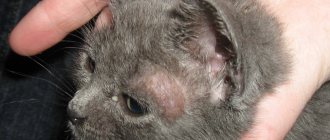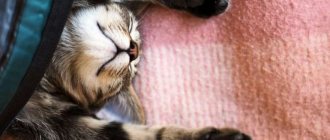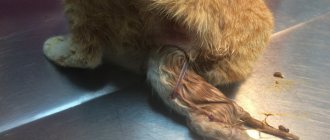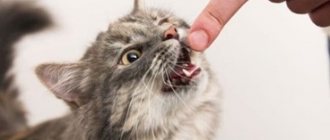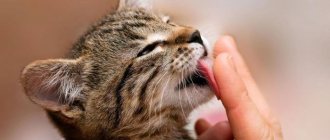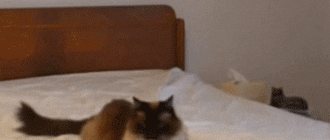Kissing is widely known in the human community as a means of affection and love, so when you try to kiss your cat, you naturally think that she will appreciate it. But when she pulls away from your affectionate kisses, it may seem like she's rejecting you. What do cats think when we kiss them, and why do they move away from the kiss?
It's still unclear what cats think when we kiss them, but it's clear that they express affection differently than humans. They may not understand what kissing means and may be confused by your actions. Because kissing imitates tilting the head back, cats sometimes lean toward them.
Your cat loves you and appreciates your attention, but if you're wondering why she doesn't like your kisses, read on. What you learn may surprise you, or it may not.
Cats Express Affection Differently Than People
In the human world, kissing is known to express affection and love. Moms and dads kiss their babies' heads, couples kiss each other, and pet parents kiss their cats and dogs out of love. But how do cats express their affection? Because they have scent glands on their faces and paws, they rub their heads against humans to mix their scents.
Other ways cats show affection are by grooming you, sitting on your lap, blinking slowly at you, and other ways. Cats have their own language, and when you understand it, you can respond in kind. But let's continue to learn more about your cat's love language.
Head bunting
If you've ever watched two cats living closely together, you may have noticed that they occasionally rub their heads against each other as a show of affection. This head rubbing shows affection thanks to the scent glands in their heads. Besides showing affection, this method mixes their scent with your scent when they do this to you.
Slow blink
When you look directly into your cat's eyes, you may notice that she reacts with widened eyes and fear. The reason the cat reacts this way is that in the wild, animals that look at other animals usually have predatory intentions. Looking into your eyes tells your cat that you have bad intentions and will keep an eye on you until the threat is gone.
On the other hand, when you blink slowly at a cat, it relaxes because it means you are not a threat. Blinking slowly is a sign of trust and love, and when your cat blinks slowly at you, she is telling you that you are trustworthy enough to close her eyes around you.
Looks after you
Mother cats care for their kittens out of love and care. Cat friends groom each other because they love each other and want to take care of each other. When your cat licks you, she is grooming you and sharing her love with you in a way she understands. Many cat parents can probably agree with this, and cats used to "groom" their fur.
Sit on your lap
Cats will not sit on the laps of those they don't trust or like. Therefore, when your cat sits on your lap, it shows great trust and love for you. It could also mean that your cat is cold and needs to warm up a little. However, some cats refuse to sit on someone's lap due to previous trauma. But that doesn't mean your cat doesn't love you. It just means she has some work to do.
Cat tongue
Among other acts that cats do as a sign of love, they also show their affection using their tongue. Chirps, meows and purrs mean that your cat loves you and is telling you this the only way she knows how - vocally. Try imitating her tongue to show your cat love.
How do cats say “I love you”?
As mentioned earlier, cats have their own characteristics. This means their version of kissing and hugging will also be special for them. Some will bite you as a sign of aggression, while others may do it in a way that makes them think of you as family. Lick, smell, purr and play, everything in general is intimate, that loves and trusts you. Licking is perhaps the closest thing to a human kiss. They probably love you like family, licking you to get ready and show you that you're close.
When cats approach you, you will often rub your head or even scratch your claws in your pants. This is a sign of love, but there is another interesting aspect. Cats have glands on their face and legs that secrete pheromones. When they rub against you in this way, they mark and point out other cats and animals they own...
Cats will also use their tail to show you how they feel about a situation. If they have a tail and are moving slightly, this usually indicates that they are receptive to your affection. If they straighten their ears, whistle, or fight to escape, then you need to back off and give them space.
Some cats are prone to kissing, while others avoid them.
When you kiss your cat, does she try to avoid your kisses or cling to them? Not all cats like to be kissed, and they will tell you this by moving their head or pressing their ears. If they feel threatened by your kisses, they may even hit you and run away.
However, some cats appreciate kisses and will lean towards you to receive them. But they only do this if they've been kissed before and they know you're not threatening them.
What should you do if your cat moves her head to the side or hisses at you when you try to kiss her? The simple answer is don't kiss the cat. Since this is a boundary your cat is setting, you need to respect it and back off.
Precautionary measures
According to many avid cat lovers, all of the above reasons apply to street cats. Why can’t you kiss domestic cats, those that don’t go outside the apartment? The arguments are the same. Of course, for an absolutely domestic pet, the chance of contracting any disease is not that great, but it is there. We ourselves bring many fungi and bacteria home on our outdoor shoes and clothes. This means that everything said above remains relevant.
If not kissing a pet is beyond your strength, then try to at least minimize all risks:
- give your pussy all the necessary vaccinations;
- treat the fur with anti-flea drugs even if you are sure that there are no “guests”;
- never feed your animal raw fish or meat;
- Clean the cat litter box as often and diligently as possible;
- Give yourself and your pet regular preventive maintenance against worms;
- Get regular check-ups with your veterinarian.
Kisses imitate the flight of the head
Cats who enjoy kisses may view them as a type of head pat. As mentioned above, this is one of the ways cats show their affection. Because they rub their cheeks against each other to show affection and impart their scents on each other, kissing may be perceived by your cat as you doing the same thing as them.
If you rub your cheek against your cat's cheek and then kiss her on the head, she will likely respond favorably because the cat perceives this as "butting."
Of course, not all head bunting (or head butting) is gentle. Some types of head butting are aggressive and can hurt you or knock points off your face. If your cat is aggressive towards you, she will smell her scent on you to warn other cats to back off.
Dangerous neighborhood
By receiving good nutrition and regular grooming, your pet can look completely healthy: well-fed sides, radiant eyes, shiny coat. However, it can be a carrier of pathogenic particles dangerous to humans, including viruses, bacteria, fungal microflora and parasites.
If a cat has access to the street and “walks on its own,” then the likelihood of bringing infection into the house on its paws and fur increases tenfold. Dirty travel through garbage cans and basements, eating garbage, contact with rats and unkempt stray creatures increases the risk of transmitting pathogens of dangerous diseases to owners:
- Rabies . The deadly virus usually enters the bloodstream through the bite of a sick animal. However, there have been cases of infection through saliva that gets onto the wound surface of the skin or mucous membrane. In the wild, the main source of the disease is foxes, and in the city - stray dogs and cats. The virus spreads along nerve fibers and affects the central nervous system, leading to aggressive behavior, paralysis and death. Veterinarians warn: you should never touch, much less pick up or press an unfamiliar cat to your face. The closer the site of initial penetration of the pathogen is to the head, the shorter the incubation period and the less time to take preventive measures and administer a life-saving vaccine.
- Toxoplasmosis . The causative agent of toxoplasmosis is the microscopic parasite Toxoplasma gondii, which enters the body through contact with infected animals, their blood, entrails and feces, as well as through eating poorly cooked or fried meat. If a pet is a carrier of toxoplasma, the owner can easily become infected by changing the litter in the cat's litter box and forgetting to wash their hands afterward. Some people have asymptomatic toxoplasmosis, while others experience a slight increase in temperature, conjunctivitis, lethargy, swollen lymph nodes, and dysfunction of the liver, heart, and nervous system. Toxoplasma poses a particular danger to pregnant women, causing intrauterine fetal death, serious developmental disorders and the birth of an oligophrenic child.
- Salmonellosis . This is a highly contagious infectious disease of animals caused by bacteria from the genus Salmonella and affecting mainly the digestive and respiratory systems. In young animals, the disease is severe, with general intoxication, fever, signs of acute gastroenteritis and bronchitis. A pet can become infected with salmonella through contact with sick pets, birds and harmful rodents. If sanitary standards are not observed at poultry farms, poultry carcasses and eggs become the source of the disease. A person runs the risk of getting salmonellosis by caring for a sick kitten or eating meat products that have not passed veterinary control.
- Chlamydia . In cats, the intracellular bacterium Chlamydophila felis most often affects the eyes, leading to chronic conjunctivitis. In babies from 1 to 3 months, severe inflammation of the mucous membrane of the eyes and profuse lacrimation are accompanied by decreased activity, runny nose, swelling of the throat and bronchitis. Mature cats become infected through sexual contact, newborn kittens - when passing through the female's birth canal. In humans, the course of feline chlamydial conjunctivitis has a lubricated form and proceeds easily. Infection is possible through contact with a carrier animal. For treatment, eye ointments containing antibiotics are used.
- Dermatomycoses . Fungal infections of the skin, known as ringworm, lead to redness, itching, dandruff, bald patches and brittle hair. The course of the disease is complicated by the addition of a pyogenic infection. Young children are most sensitive to dermatomycosis due to instability of the immune system and non-compliance with mandatory hygiene rules. If symptoms of the disease are detected in a cat, treatment should be started immediately, and all family members should undergo a preventive examination by a dermatologist.
- Helminths . Cats can be hosts to several types of parasitic worms (worms), which live primarily in the intestines, but cause intoxication of the entire body. Kittens are most often infected with roundworms (nematodes), the most common of which are roundworms. Their number can be so great that the intestinal wall ruptures and the baby dies from peritonitis. Adult animals are infested with tapeworms, the most dangerous of which is echinococcus. In the human body, the larva travels through the bloodstream into the liver and forms blisters there, in which it slowly develops and grows. Cats become infected with helminths from each other, or by eating raw meat, liver, or fish with microscopic larvae. Freshwater bodies of water are especially unfavorable, so it is recommended to thoroughly boil the catch from there. Worm eggs are released into the external environment with feces and often remain on the animal’s fur, so a person can become a carrier of helminths during daily interaction with a cat. As a preventative measure, you should regularly give your pet antihelminthic drugs and avoid feeding poor-quality food.
We recommend viewing
Do cats mate with their siblings? Do cats miss their owners when they are returned home? Black Cats
But you need to pay close attention to your cat's body language to determine how she feels about your affectionate gestures. The following should tell you that your cat is not happy with what you are doing:
- Ears flattened or laid back
- The tail is down and wagging
- Hisses at you
- They hit you with or without claws
- Your cat moves its head to avoid the kiss.
Cats are fickle creatures, and if they don't like your kisses, it doesn't mean they reject you. It just means that they are setting boundaries that you should not cross.
05.05.2019
“Do you know what is the most wonderful thing about our animals? This is their ability to put up with our most strange and unacceptable behavior among their relatives. Animals watch their owners and gradually learn to understand their actions. For the sake of your own peace of mind and for the sake of showing affection to a person you trust.” (Wilma Tigelaar, veterinarian and animal psychologist)
We live in a stressful world, filled with daily bad news on TV, problems in the family and hassle at work, and the ill will of others. We are increasingly withdrawn into ourselves and are ready to fight back at any moment.
Observation sector
How well cats see our world if they notice even those objects to which, it would seem, they do not pay attention! Every owner of a domestic cat knows that his pet can, in a sharp jump, catch a bird or a small rodent, the location of which “seemed to be of no interest” to her, and she “seemed to be dozing” when the mouse took the tenth route around the cat.
Cats have the ability to move their eyes relative to the visual axis
It is impossible to maneuver a cat with such maneuvers - the animal’s angle of vision is 270 degrees, it notices everything. Everything! And if you also use your sense of smell and hearing, then it’s better for the mice not to stick their heads out at all - they’ll catch you.
Scientists have defined cat vision as stereoscopic binocular - the animal can move its eyes relative to the visual axis. Few living beings are capable of this.
The benefits of communicating with cats
Scientists have proven that the benefits of communicating with furry pets are undeniable: even the very presence of a cat has a beneficial effect on the owner’s psyche, especially tactile contact when he picks it up and strokes it. In addition to purely moral satisfaction, communication with a pet improves well-being due to:
- activation of blood flow;
- warming the body, which is especially important during inflammatory processes and radiculitis;
- normalization of blood pressure and heart rate through activation of neurons from contact with cat fur.
In addition, it is noted:
- faster and more productive socialization of children with Down syndrome - constant contact with a cat makes it easier to get into contact with society;
- increasing stress resistance;
- quick relaxation after a busy day for all people, this is especially important for those whose work involves stress;
- getting rid of insomnia;
- reduction of symptoms of “chronic fatigue syndrome”, rapid fatigue disappears.
Thus, the benefits of tactile communication with your pet are undeniable. However, it should be remembered that it is impossible to force a cat to sit with its owner and treat him. The cat will leave if at the moment he did not plan to sit with the owner and purr. There will be no benefit from this, even if you forcibly hold the animal on your knees. It is better to wait until the cat is ready to do this.
Positive and negative effects of cats on human health
In a word, you can and should kiss cats, but at a certain distance. This is optimal contact for both four-legged animals and humans. The cat will feel that the owner loves her and respects her personal space, and the person does not need to be afraid of contracting unpleasant microorganisms or infections.
Attention! A cat and a person belong to different species, which means they have different languages and preferences, and you should not try to force animals to love you by forcibly hugging and kissing them.
You can watch a video on the dangers of kissing cats here:
Is it possible to kiss a cat?
I'd say there's nothing wrong with showing your cat how much you love her by giving kitty a smack on the head.
However, keep in mind that there are still some risks, especially if you kiss your pet on the lips. This largely depends on the health status of your pets.
So let's see what can happen if you kiss a cat.
© shutterstock
Common diseases
Here are some of the most common diseases that can pass from cats to humans. Agree, this is a pretty good reason why you shouldn’t kiss cats.
- Toxoplasmosis. This disease affects the liver, spleen, eyes, nervous system, heart and other organs. It is especially dangerous for girls “in an interesting position.” Toxoplasmosis can cause irreversible intrauterine damage to the fetus and affect its development.
- "Scratchies." This disease is quite common, although it is not very common to talk about it. The scratched areas can become very inflamed. A rash may appear, an allergic reaction, intoxication, and inflammation of the lymph nodes may occur.
- Worms. The disease is caused by parasites that live in the bodies of cats and humans. It's very easy to get infected. Don’t think that if your pet doesn’t go outside, then it’s “clean.” If a cat eats raw meat or fish, then it definitely has worms.
- Rabies. A fairly well-known disease that can be fatal. It is transmitted by bites along with the saliva of a sick animal. Of course, domestic pussies rarely go wild, but it still happens.
- Plague. This is a very dangerous disease. It is generally accepted that it is carried by rats, but cats can also be sources of infection. In humans, the plague causes severe fever, sepsis and attacks the lungs.
- Felinosis. It manifests itself in humans in the form of a rash, pustular inflammation, fever and other unpleasant symptoms. It is transmitted mainly from cats through mucous membranes and saliva.
- Lichen. A very unpleasant and common disease. Fungal infection causes hair loss, severe itching, sores and redness. It takes quite a long time to heal.
How to win the love of a cat, or Cats and 5 languages l
San Sanych Protsenko
In my childhood and youth, I lived with my parents and we had a cat, an ordinary “Central Russian domestic” breed with a character that is now fashionable to call “bitchy.” All the 10 years that we lived together, I was tormented by the question - why does the cat love my father, but only allows me to stroke itself, and even then not always.
The final answer was formed after studying G. Chapman’s book “5 Love Languages” and 2 years of communication with a cat in my own family of 3 people (father, mother and daughter).
Captain evidence suggests that cats are not dogs, whose love for their owner is almost genetically based; a cat’s love is not easy to win – and its choice is not always clear.
The author of the book “5 Love Languages” postulates that harmonious relationships are built on 5 aspects of interaction, conventionally called “love languages”, and each has priority ones, and there are secondary ones. If you address the object of your love in the right language in the right proportions, then reciprocal love is practically guaranteed to you - everything is simple, like everything American - do it once, do it twice, and enjoy the result.
I propose to consider how this scheme works on cats.
Language first. Acts of service.
“By acts of service I mean doing those things that your spouse desires. You look for a way to please her by serving her, express your love by doing something for him."
The most important act of service for a cat is cleaning its litter box; cats are very clean creatures and therefore are very sensitive to their “toilet”. My cat is so spoiled that after relieving herself, she runs to me and meows for me to clean up immediately, closely watching the cleaning process. Perhaps this is one of the most important languages for communicating with a cat; I can’t think of other examples of the “Act of Service.”
Language is second. Physical touch.
“It has long been known that physical touch is one of the ways to convey emotional love. Numerous studies in the field of child development have concluded that young children who were carried, hugged and kissed were emotionally healthier than those who were deprived of physical contact for long periods of time.”
In this aspect, cats are great specialists - there is a well-known theory that cats even learned to purr in the process of communicating with humans; wild cats do not purr. This is a simple and mutually pleasant language for communicating with a cat, the main thing here is not to overdo it - cats often like to be alone, and it is advisable to pet the cat when she wants it, and not you)
The third language. Quality time.
“By quality time, I mean time when you give a person your undivided attention.”
Cats, especially those living indoors, need movement and can also get bored. Any game with her can be useful and exciting - simple “cat and mouse” with a piece of paper, a rag or a string will bring her genuine joy, and even adult cats sometimes like to fool around like kittens or “hunt” you by jumping out of ambush. The best form of play, which my cat came up with herself, is very common among dogs - she brings me her dirty rag mouse, I throw it and the cat, without the “fetch” command, runs after it and brings it back.
The fourth language. Words of approval.
“One way to express love emotionally is to use words of encouragement.
How to show affection to your pet correctly
You need to hug and cuddle your cat correctly and on time. So, if an animal is in a hurry to go to the toilet to relieve its physiological needs, it is unlikely that it now wants to kiss or hug. A cat waiting for a tasty lunch or dinner can behave no less aggressively.
The optimal time to hug a domestic cat, pet it, scratch it behind the ear or under the neck is a relaxed, calm and, of course, well-fed state. A well-fed and sleepy cat accepts the attention shown to him with great pleasure and a loud purr.
You cannot suddenly grab a cat and start squeezing it. Sudden loud sounds frighten pets, and tight hugs, reminiscent of a vice, cause pain and often cause injuries and fractures.
You should not expect love and complaisance from a cat who leads a street lifestyle. Unlike a domestic pet, a street cat has a freedom-loving and restive character, so you can hug and pet such a pet only with his permission.
Guided by such simple rules, every owner will learn to understand their pet and show signs of attention at the right time.
Main reasons for the ban
Why pregnant women should not pet cats or have contact with them
To protect yourself and your health after squeezing your cat, you just need to wash your hands well with soap. This can protect a person from germs and bacteria that may be on the animal’s fur and saliva.
Important! The microbes themselves are not very dangerous until they are on the skin, but if they get into the mouth or mucous membranes, the consequences can be very unpredictable. There is no need to risk your health again.
Kissing cats is especially dangerous for children.
Doctors' concerns
Veterinarians and therapists unanimously recommend not kissing cats. Tactile contacts, and even more so kisses, should be left for your children, loved ones and relatives. For many, a cat is part of the family, but despite this, it belongs to a different biological species, which means that such contacts with it do not bode well, especially for children.
Sanitary and hygienic reasons
Unlike dogs, cats are very clean animals. They poop and pee in only one place, wash themselves several times a day, but all the fears are tied to the fur. It not only causes allergies in a certain circle of people, but is also a habitat for a huge number of microbes and parasites.
Important! If a cat is clean in appearance, this does not mean that it is not infected with any parasites and does not carry germs. Even indoor pets can carry dust mites.
In addition, a litter box-trained cat can still get its paws dirty with feces and urine, spreading it around the house. In such places, including paws, the concentration of microbes will be greatest. Tailed animals have good immunity, and if the pet itself is not sick, this does not mean that there are no pathogenic bacteria or parasites in its body.
There are a lot of bacteria and germs on a cat's paws.
Psychological reasons
Psychological reasons also exist. Over centuries of coexistence with animals, humans have become very attached to them. Unfortunately, he doesn't always know what they need. Excessive care has a negative impact on animals, and they grow up spoiled and are more likely to play pranks.
Mystical reasons
A long time ago, people thought that cats had a connection with the other world, and not with the best part of it. In the Middle Ages, it was believed that these pets were assistants to witches and sorcerers, who through them carried out their dirty deeds. Many were sure that if you kiss a cat, a person can become its slave. All the negativity towards the tailed ones disappeared over time. Cases of mass catching of plague rats by cats during the pandemic in Europe played a big role in this.
Is it possible to kiss a cat on the lips?
They say that a cat's mouth is much more hygienic than a human's. In addition, the bacteria that settle in the mouth are similar to human ones.
However, some of the bacteria in an animal's mouth can cause gum disease. After all, a pet is, first of all, a predator, and it eats animals and insects, which, in turn, can be carriers of unpleasant, even dangerous diseases.
Even this circumstance should warn a person against excessive kissing with his pet.
Of course, you can take some steps to protect yourself, such as brushing your pet's teeth or using mouthwash, but it's safer to not kiss your pet at all.
Releases claws
We are talking about when a cat gently releases its claws and kneads its owner with its paws, as if giving a massage. This is another sign of cat love.
There is no need to doubt your pet's feelings. Cats only pretend to be willful and independent animals. In fact, they are just as attached to their owner as dogs. They just don’t like to show their emotions once again or do it much more restrained.
In our love for pets, we often cross the boundaries of what is permitted. What can come of this? Find out the story of one cat who will have to lose half his body weight.
Photo: pixabay
